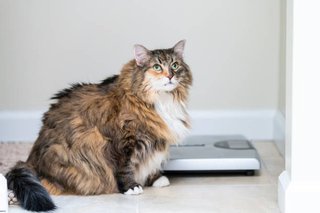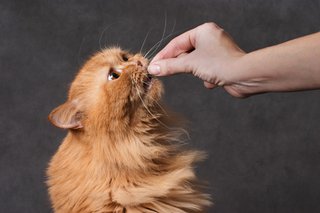Cats and obesity

Keep your cat mentally stimulated and offer plenty of opportunities for exercise, and you will have fewer opportunities to be destructive in your home.
If your cat is frustrated or bored, he can chew on his plants, scratch his furniture, or tear his curtains. Changing your cat's behavior is not impossible, but frequent exercise is one of the best solutions to behavior problems. Exercise is also essential to your cat's health because it improves the function of his heart and blood vessels while building muscles.
Exercise helps prevent overweight and obesity.
Obesity is the number one nutritional disorder among cats. Studies suggest that approximately 25 percent of cats presented to veterinary clinics are overweight. The number of obese cats seems to constantly increase as the cat has evolved from living as a hunter in barns and outdoors to a more sedentary housemate. These lifestyle changes, along with increased availability of tasty, energy-rich pet food, have contributed to a higher incidence of obesity in adult cats. This added weight puts your cat at risk for certain health problems related to the cardiovascular, respiratory, and skeletal systems. Documented research indicates that obese cats are much more likely than cats of normal body weight to have diabetes, arthritis, and a very serious disorder called liver lipidosis.
Knowing how to recognize the signs of obesity and take corrective action is important. But the most important thing is to know how to keep pets in good condition to start, thus avoiding the development of obesity in the first place. However, regardless of predisposing factors, the underlying cause of obesity in all animals is excess energy. The more exercise your pet does, the more calories it will burn and the less fat it will accumulate. Keep your cat's activity level in mind when deciding how much food to feed.
To improve the cat's physical activity, you can add some interactive toys to the cat's environment. Get your pet toys that simulate escaping prey so you're more interested in playing. You can also adopt another cat so that you can both have "someone" to play with.

Treats
It is very common for cat owners that as soon as their cat starts begging or vocalizing, they try to keep it closed by giving it a gift. This vocalizing behavior is a normal social trait and is not related to the cat being hungry. Every time you treat your cat when it's vocalizing, you're "rewarding" him for it or, in other words, training him to do it. Try not to give your cat treats as it will help him lose weight and not teach him to vocalize further.
For those pets at risk of being overweight or for those animals that already carry additional kilograms, one or more of the following guidelines apply:
Reduce or eliminate table leftovers and treats. These are often high in fats and calories that contribute to excessive intake;
It is best to measure the amount of food your animal receives and then feed it any amount. This helps keep the portion size constant and avoids the natural tendency to pour a little more into the bowl;
Increase the amount of exercise your pet receives. For cats, the owner may have to tempt the pet to play as a way to increase activity;
Consider switching to a low-calorie or light pet food. These products are typically lower in fat and higher in fiber. This allows the owner to continue serving a good-sized portion while reducing the amount of calories the pet actually receives;
Consult a vet before beginning any weight reduction program. The vet will design a weight loss program for the individual pet and help identify specific problems and suggest alternatives along the way. Weighing the pet periodically is also helpful to track progress.
1st Choice recommends feeding with our Weight Management formula to help your cat lose those extra pounds. This superior quality pet food helps promote optimal pet health while supporting their immune systems. However, it is recommended that you ask your vet the best way to administer your pet's weight loss program.